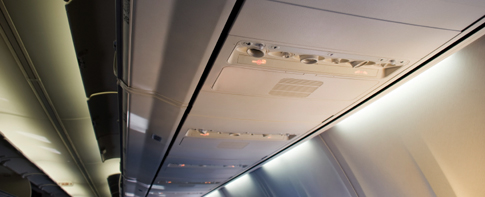How many times have we seen or heard of this scenario? A passenger boards an aircraft with bags that he or she did not want to check because they wanted to avoid paying airlines fees, or were in a rush to leave the airport on arrival in their destination. They have managed to avoid placing the item in the framed screening module outside of the aircraft that would have forced them to check the item. They struggle to place their overstuffed luggage into the overhead bin, sometimes on their own or with the assistance of a flight attendant. But the bag is too large, too heavy or bulky. They lose control of the suitcase and it falls right onto the head of the passenger seated immediately beneath the bin. Often, the heavy item is a bag filled with multiple duty free liquor bottles that are stuffed into the bin, only to topple out upon landing to crash into the innocent and unsuspecting passenger below.
Falling baggage from overhead bins is now amongst the biggest risk of serious personal injuries to commercial airline passengers and are causing thousands of injuries per year! Checked baggage fee-hungry airlines are causing more passengers to overload their bins and overworked flight attendants and airlines workers, under more pressure to keep flights on schedule, are basically looking the other way.
A 1998 report by the Flight Safety Foundation revealed that thousands of passengers every year suffer head and neck injuries as a result of bags falling from overhead bins. Passengers are familiar with the announcement to “please be careful when opening overhead bins as their contents may have shifted during flight.” However, airlines do not tell their passengers that if the overhead bins malfunction and flight injuries occur, the airline may be responsible.
Domestic airlines must also have a Carry-On Baggage program approved by the Federal Aviation Administration. According to Section 121.589(a) of the Federal Aviation Regulations (FAR) established by the FAA, every airline must control the size and number of carry-on items allowed onboard, generally not to exceed 9 x 14 x 22 inches (22 x 35 x 56 cm). If an FAA investigation into an accident related to an overhead bin malfunction reveals that members of the airline crew did not adhere to their program, the airline may be further responsible for all injury liability.

Per FAA regulations, flight attendants must check to ensure that all overhead bins are latched and securely fastened before the airplane doors can be closed for takeoff. Failure to adhere to these regulations can result in injury from falling baggage, especially if the overhead bins have been filled beyond their load capacity, which is very often the case with major airlines.
A study conducted by Dr. Leo Rozmaryn for FSF vol. 45, No. 3, estimated that 4,500 injuries occur every year due to bags falling from overhead bins. Combine this with the fact that many domestic allow carry-on luggage weighing up to 40lbs, and it’s no surprise that many of these falling luggage injuries are quite severe, resulting in concussions, minor traumatic brain injuries, (MTBI), herniated discs, nasal fractures, shoulder injuries all of which may require surgery to the injured victims.
Concussions and MTBI’s are potentially serious injuries and can result in years of pain, disability and dysfunction to their victims. Airplane accident lawyers Bohrer & Lukeman have successfully represented numerous passengers injured by bin malfunctions that caused luggage to fall and hurt them.
In some cases, the bin “pops” open because another passenger has overstuffed it and the flight attendants have failed to properly inspect the aircraft. Other times, a crewmember or another passenger simply loses control of the bag and it falls. Moreover, if the accident and injury occurs during the course of an international flight, the airline may be liable under the Montreal Convention and may be required to pay damages for the actions of another passenger even if the accident was caused by the actions of another passenger. In fact, in a recent New York federal court decision, a judge ruled that a bag dropped by one passenger that injured another was an “accident” as defined by the Montreal Convention.
If you or a loved one has been injured by luggage falling from an overhead bin on a commercial airline flight, please call our airplane accident lawyers today for a free consultation. We have successfully represented passengers who have suffered concussions, brain, spinal and other injuries by bags dropped or falling from overhead bins in both domestic and international flights. We will fight the airlines to get you the compensation you deserve!
Some of our recent overhead bin cases:
- A United passenger who suffered knee and shoulder injury after bags fell from the overhead bin and struck her
- A Delta Passenger hospitalized for head injury by a heavy bag being lifted into the overhead by a crew member
- A Qatari Airlines passenger who suffered a head injury from a falling overhead bag
- A US Airways passenger who suffered severe head and neck injuries from a bag dropped from an overhead bin
- A British Airways passenger who suffered an overhead bin injury on flight from Ghana to Newark
If you or a loved one has suffered an injury from a falling bag or overhead bin malfunction, you need the services of an aviation accident attorney lawyer familiar with aviation accident law. The airplane accident attorneys at Bohrer & Lukeman are experienced with injuries and accidents that occur on airplanes. Call us at (212) 406-4232 or fill out our contact form today.

